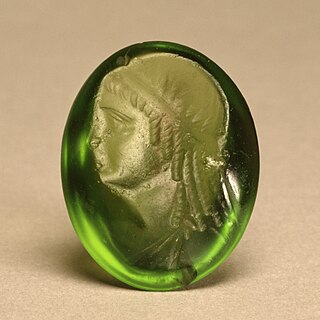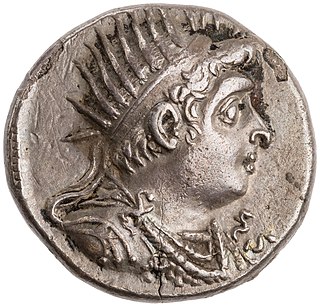Related Research Articles

The Ptolemaic dynasty, sometimes also known as the Lagids or Lagidae, was a Macedonian Greek royal family, which ruled the Ptolemaic Kingdom in Egypt during the Hellenistic period. Their rule lasted for 275 years, from 305 to 30 BC. They were the last dynasty of ancient Egypt.

The 2nd century BC started the first day of 200 BC and ended the last day of 101 BC. It is considered part of the Classical era, although depending on the region being studied, other terms may be more suitable. It is also considered to be the end of the Axial Age. In the context of the Eastern Mediterranean, it is referred to as the Hellenistic period.
Year 47 BC was a year of the pre-Julian Roman calendar. At the time, it was known as the Year of the Consulship of Calenius and Vatinius. The denomination 47 BC for this year has been used since the early medieval period, when the Anno Domini calendar era became the prevalent method in Europe for naming years.
This article concerns the period 179 BC – 170 BC.
This article concerns the period 199 BC – 190 BC.
Year 34 BC was either a common year starting on Friday, Saturday or Sunday or a leap year starting on Friday or Saturday of the Julian calendar and a common year starting on Friday of the Proleptic Julian calendar. At the time, it was known as the Year of the Consulship of Antonius and Libo. The denomination 34 BC for this year has been used since the early medieval period, when the Anno Domini calendar era became the prevalent method in Europe for naming years.
Year 124 BC was a year of the pre-Julian Roman calendar. At the time it was known as the Year of the Consulship of Longinus and Calvinus and the Fifth Year of Yuanshuo. The denomination 124 BC for this year has been used since the early medieval period, when the Anno Domini calendar era became the prevalent method in Europe for naming years.

Cleopatra VII Philopator was the last active ruler of the Ptolemaic Kingdom of Egypt. As a member of the Ptolemaic dynasty, she was a descendant of its founder Ptolemy I Soter, a Macedonian Greek general and companion of Alexander the Great. After the death of Cleopatra, Egypt became a province of the Roman Empire, marking the end of the second to last Hellenistic state and the age that had lasted since the reign of Alexander. Her native language was Koine Greek, and she was the only Ptolemaic ruler to learn the Egyptian language.

Alexander Helios was a Ptolemaic prince and was a son of the Macedonian queen Cleopatra VII of Ptolemaic Egypt by Roman triumvir Mark Antony. Alexander's fraternal twin sister was Cleopatra Selene II. Cleopatra named her son after Alexander the Great. His second name in Ancient Greek means "Sun"; this was the counterpart of his twin sister's second name Selene (Σελήνη), meaning "Moon".

Demetrius II, called Nicator, was one of the sons of Demetrius I Soter possibly by Laodice V, as was his brother Antiochus VII Sidetes. He ruled the Seleucid Empire for two periods, separated by a number of years of captivity in Hyrcania in Parthia: first from September 145 BC to July/August 138 BC and again from 129 BC until his death in 125 BC. His brother Antiochus VII ruled the Seleucid Empire in the interim between his two reigns.

Cleopatra I Syra was a princess of the Seleucid Empire, Queen of Ptolemaic Egypt by marriage to Ptolemy V of Egypt, and regent of Egypt during the minority of their son, Ptolemy VI, from her husband’s death in 180 BC until her own death in 176 BC.

Ptolemy VI Philometor was a king of Egypt from the Ptolemaic period. He reigned from 180 to 164 BC and from 163 to 145 BC. The eldest son of Ptolemy V Epiphanes and Cleopatra I of Egypt, he came to the throne as a very young child in 180 BC and the kingdom was governed by regents: his mother until her death in 178 or 177 BC and then two of her associates, Eulaeus and Lenaeus until 169 BC. From 170 BC, his sister-wife Cleopatra II and his younger brother Ptolemy VIII Euergetes were co-rulers alongside him.

Cleopatra II was a queen of Ptolemaic Egypt who ruled from 175 to 116 BC with two successive brother-husbands and her daughter—often in rivalry with her brother Ptolemy VIII.

Cleopatra Thea surnamed Eueteria was the ruler of the Hellenistic Seleucid Empire. She was queen consort of Syria from 150 to about 125 BC as the wife of three Syrian kings: Alexander Balas, Demetrius II Nicator, and Antiochus VII Sidetes. She ruled Syria from 125 BC after the death of Demetrius II Nicator, eventually in co-regency with her son Antiochus VIII Grypus until 121 or 120 BC.

Ptolemy XII Neos Dionysos Philopator Philadelphos was a king of the Ptolemaic dynasty of Ancient Egypt. He was commonly known as Auletes, referring to the king's love of playing the flute in Dionysian festivals. As a member of the Ptolemaic dynasty, he was a descendant of its founder, Ptolemy I.

Ptolemy VIII Euergetes II Tryphon, nicknamed Physcon, was a king of the Ptolemaic dynasty in Egypt. He was the younger son of Ptolemy V Epiphanes and Cleopatra I Syra. His reign was characterised by fierce political and military conflict with his older brother Ptolemy VI Philometor and his sister Cleopatra II.

Ptolemy IX Soter II, commonly nicknamed Lathyros, reigned twice as king of Ptolemaic Egypt: first as Ptolemy Philometor Soter in joint rule with his Cleopatra II and Cleopatra III, and then again as Ptolemy Soter. He was the son of Ptolemy VIII and Cleopatra III.

Ptolemy X Alexander I was King of Egypt from 107 BC till his death in 88 BC, in co-regency with Cleopatra III as Ptolemy Philometor Soter until 101 BC, and then with Berenice III as Ptolemy Philadelphus. He was a son of Ptolemy VIII Physcon and Cleopatra III, and younger brother of Ptolemy IX. His birth name was probably Alexander.

The Syrian Wars were a series of six wars between the Seleucid Empire and the Ptolemaic Kingdom of Egypt, successor states to Alexander the Great's empire, during the 3rd and 2nd centuries BC over the region then called Coele-Syria, one of the few avenues into Egypt. These conflicts drained the material and manpower of both parties and led to their eventual destruction and conquest by Rome and Parthia. They are briefly mentioned in the biblical Books of the Maccabees.